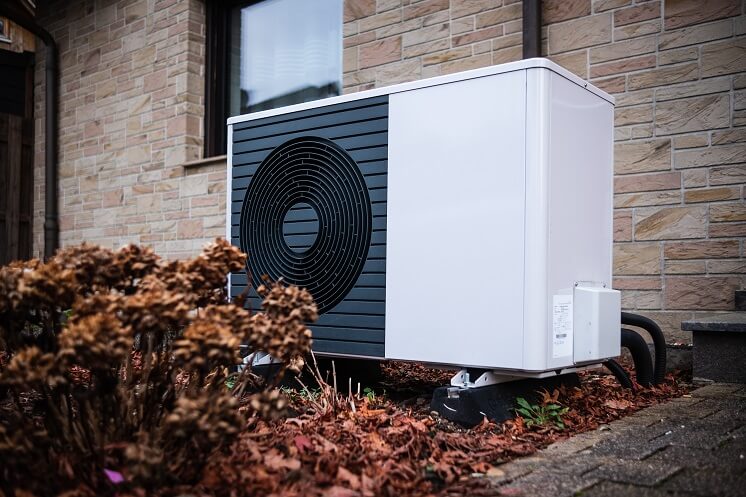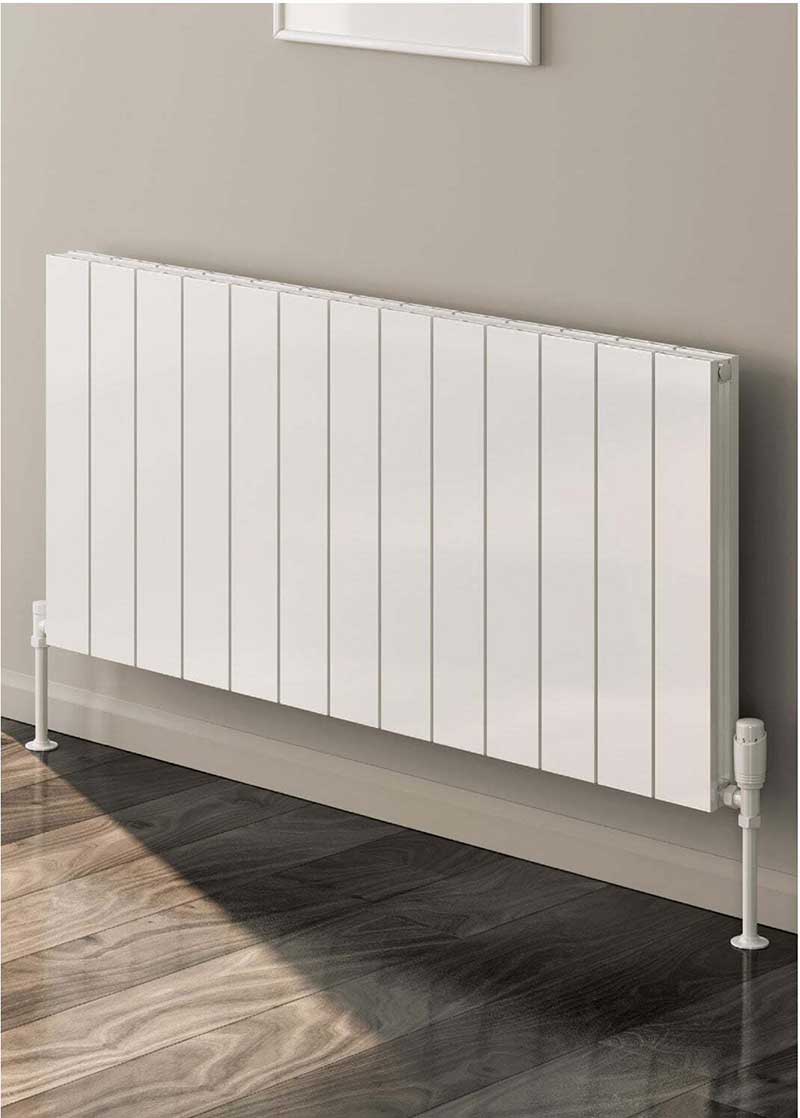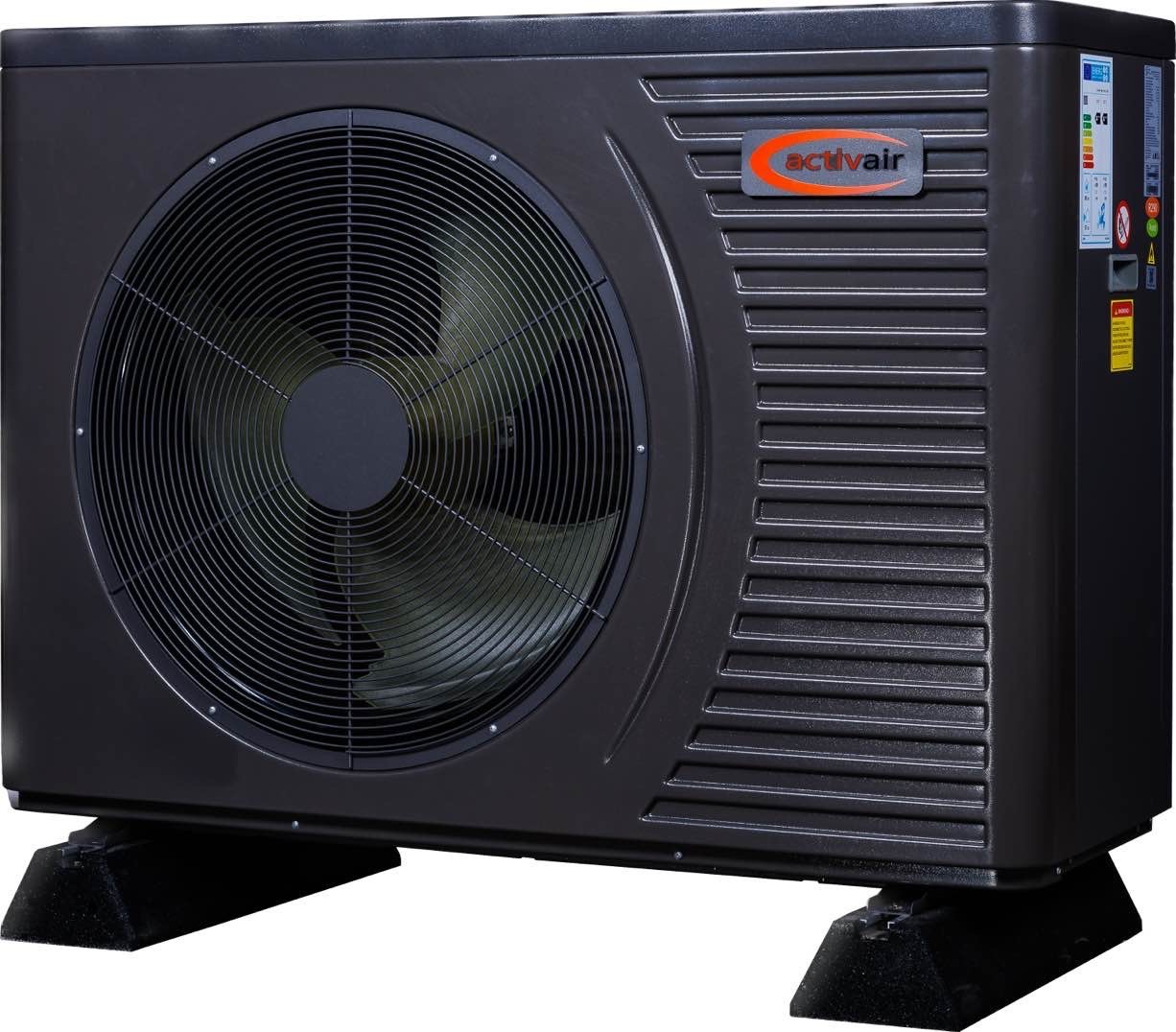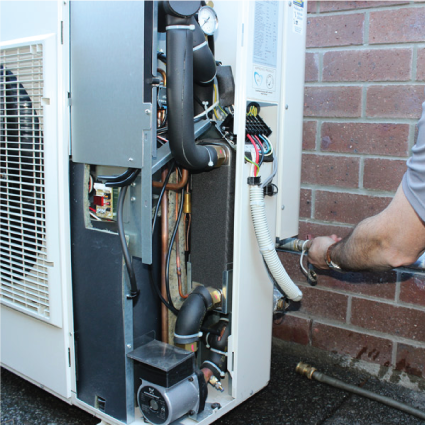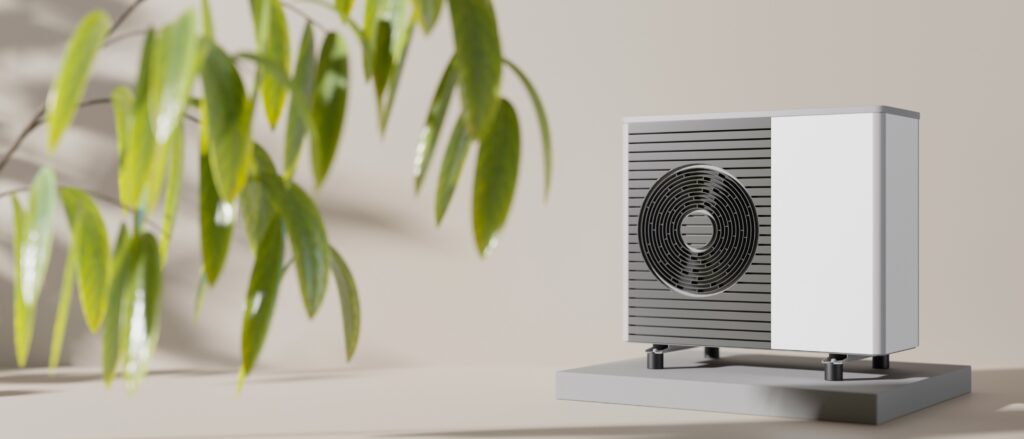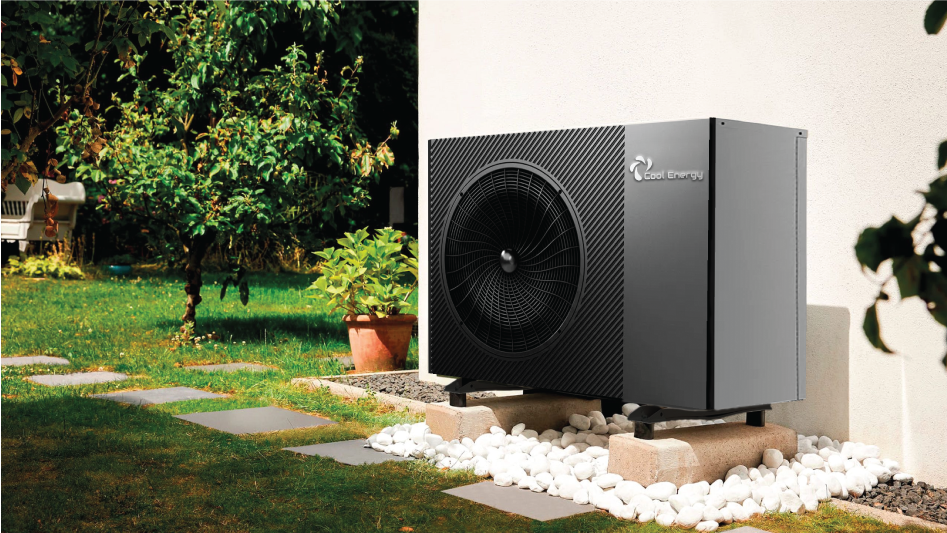- Heat pumps make about as much noise as a refrigerator
- Heat pumps are 2.4 times more efficient than gas boilers during winter
- You can get £7,500 off a heat pump through the Boiler Upgrade Scheme
As it currently stands, only 3% of homes in the UK are equipped with heat pumps. However, this is expected to change in the near future due to the government’s Boiler Upgrade Scheme. This scheme aims to reduce the costs associated with heat pumps for households all across the country.
As heat pumps continue to gain popularity in the UK, there are some myths that have started to circulate. But don’t worry, we are here to debunk those myths and provide you with accurate information.
If you have any doubts or questions about heat pumps, we encourage you to check out our myth-busting points located further down the page. These points will help clarify any misconceptions you may have.
On the other hand, if you already have a good understanding of heat pumps and want to take the next step, simply fill out our form with a few details. Our certified suppliers will then be in touch with you, providing free quotes for your consideration.
Rest assured, we have all the information you need about these handy devices right here.
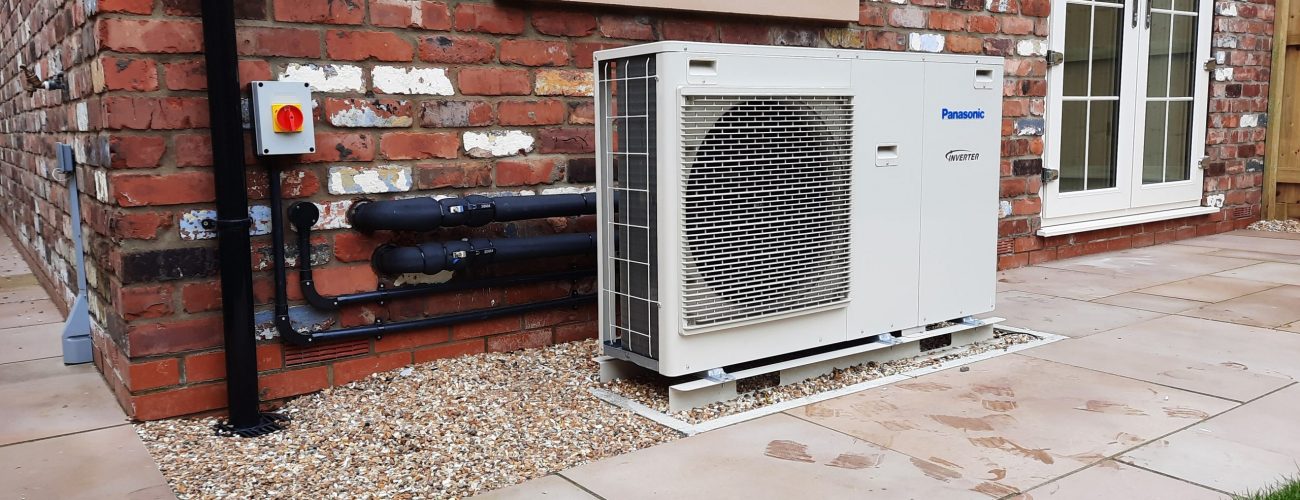
What's on this page?
Myth #1: “Heat pumps are too noisy.”
Modern heat pumps have come a long way since they first entered the market. Initially, they were known for being big, bulky, and noisy. However, thanks to years of innovation, today’s heat pumps are compact, energy efficient, and produce minimal noise.
According to the Energy Saving Trust, heat pumps generate approximately the same amount of noise as a refrigerator. This humming sound is caused by the fan of the pump, which draws air into the system. If the components of the heat pump are not installed correctly, you may experience increased noise levels. To avoid this, it is recommended to have your heat pump installed by a certified engineer.
If you reside in a block of flats and have an outdoor unit mounted on your wall, you are more likely to notice the noise. However, ground source heat pumps are more commonly used in such buildings, allowing you to easily avoid this issue.
In the event that you do notice an excessive amount of noise, it could indicate a problem with the heat pump that requires attention.
Myth #2: “Heat pumps aren’t suitable for most homes.”
Heat pumps can be installed in various types of properties, including detached houses, high-rise flats, modern homes, and old farmhouses, despite the circulating myth. However, there are a few important considerations to keep in mind before installing a heat pump in your home:
Garden Space: If you have garden space available, you can opt for a ground source heat pump. However, if you don’t have garden space, an air source heat pump can be a suitable alternative. It can be mounted on an external wall.
Planning Permission: Before installing a heat pump, it is crucial to check whether you need planning permission from your local authority. This is especially important if you live in a conservation area or a listed building.
Insulation: It is essential to ensure that your home is well insulated before installing any type of heat pump. Having proper wall and roof insulation is the minimum requirement.
Currently, only 3% of homes in the UK have a heat pump installed. However, the government has ambitious plans to install 600,000 heat pumps per year by 2028.
If you want to learn more about heat pumps and determine if they are suitable for your home, you can refer to the helpful guide titled “Is Your Home Suitable for a Heat Pump?”
Myth #3: “Heat pumps aren’t efficient during cold winters.”
Heat pumps are highly efficient, with an efficiency rate of 300%. This means that for every unit of electricity they consume, they generate three units of energy. In comparison, electric boilers are only 100% efficient, making them four times less efficient than heat pumps. The best gas boilers can achieve 98% efficiency. It is important to note that heat pumps may experience a decrease in efficiency of around 20% during the winter due to cold weather conditions. However, even with this decrease, they are still at least 2.4 times more efficient than gas boilers during the winter.
Myth #4: “The upfront cost of heat pumps is too expensive.”
Installing a heat pump can come with a significant upfront cost. On average, an air source heat pump typically costs around £10,000, while a ground source heat pump starts at around £13,000. However, it is expected that these prices will decrease over time. To make the upfront cost more affordable, there are several government heat pump grants available.
One such grant is the Boiler Upgrade Scheme, previously known as the Clean Heat Grant. This scheme is in effect from April 2022 until 2028 and provides homeowners in England and Wales with £7,500 towards the installation of a new air or ground source heat pump. These grants aim to support homeowners in transitioning to more sustainable heating options.
Myth #5: “Heat pumps only work with underfloor heating.”
Before we address this misconception, it is important to note that heat pumps have a longer heating time compared to traditional boilers. This is because heat pumps operate at a lower temperature, typically around 35-40°C, while boilers operate at 60-65°C. As a result, heat pumps require a larger surface area to achieve the same temperature level. They work best when connected to an underfloor heating system, although they can also function well with radiators. It is worth mentioning that in order to maintain a comfortable temperature, the radiators installed should be larger than usual to increase the surface area. As a general rule, radiators for heat pumps should be approximately two and a half times larger than standard radiators to provide the same heat output as a gas boiler. Additionally, it may be necessary for the average UK home to replace about one-third of its existing radiators with larger ones to accommodate a heat pump.
Myth #6: “Heat pumps take up a lot of space.”
Heat pumps have various external components, including outdoor units, pipes, and underground loops (only for ground source). However, they do not occupy a significant amount of space. In fact, the average size of a heat pump is comparable to that of a gas boiler. Typically, the outside unit of a heat pump is approximately two feet tall, one foot deep, and around 2.5 feet wide. In contrast, the smallest boiler manufactured by Worcester Bosch measures approximately 2.2 feet in height, 0.9 feet in depth, and 1.2 feet in width.
Regarding the pipes, air source heat pumps have their pipes running from the unit through the external wall, remaining hidden from view. While it is true that radiators need to be larger for a heat pump to function effectively, this issue can be avoided by choosing an underfloor heating system.
Myth #7: “Heat pumps are expensive to run.”
Switching from a fossil-fuel boiler to a heat pump can result in cost savings instead of additional expenses. In fact, by making this transition, you can save £4,340 over the lifetime of the heat pump, as opposed to sticking with a gas boiler.
The cost savings are primarily attributed to the escalating prices of fossil fuels, which are projected to rise further in the future.
It is important to note that the actual amount of money you can save will vary depending on the level of insulation in your house and whether you utilize underfloor heating or standard-size radiators.
Myth #8: “Heat pumps need to stay on all the time.”
This misconception likely originated from individuals who have experienced heat pumps in houses that are poorly insulated. When heat pumps are used in houses with inadequate or outdated insulation that needs to be replaced, the building is unable to effectively retain heat. As a result, some people may need to run their heat pumps all day.
This situation is not limited to heat pumps, as houses with boilers can also quickly heat poorly insulated buildings temporarily. In contrast, heat pumps gradually warm a house, resulting in a longer heating process. Therefore, if a home lacks proper insulation, the gradual increase in heat provided by heat pumps may not be very effective.
Essentially, if your walls, roof, and windows are properly insulated, there is no need to run your heat pumps for extended periods to maintain warmth.
Myth #9: “Heat pumps are high maintenance.”
Heat pumps are generally low-maintenance devices, contrary to the claim mentioned earlier. To maintain your heat pump, it is important to regularly clean it and ensure unobstructed airflow. For optimal condition, we suggest using our user-friendly maintenance checklist.
Servicing is only required every few years for heat pumps, but this may vary depending on the warranty terms of your specific system. With proper care, a heat pump can last up to 20 years, which is longer than the average lifespan of a boiler, typically 15 years.
Summary
Heat pumps are predicted to become more prevalent in UK homes in the future, becoming essential household items. Furthermore, with the UK government offering financial assistance, people from different backgrounds will be able to afford this cost-effective technology.
Are you interested in getting a heat pump now that you know the misconceptions have been debunked? Check out our informative guides to help you select the right type, model, and brand of heat pump. Also, complete a short form to receive free quotes from our expert suppliers.
Find out how much a heat pump would cost you
Complete A Short Form – Receive Free Quotes – Compare & Save
Find out how much a heat pump would cost you
Complete A Short Form – Receive Free Quotes – Compare & Save









